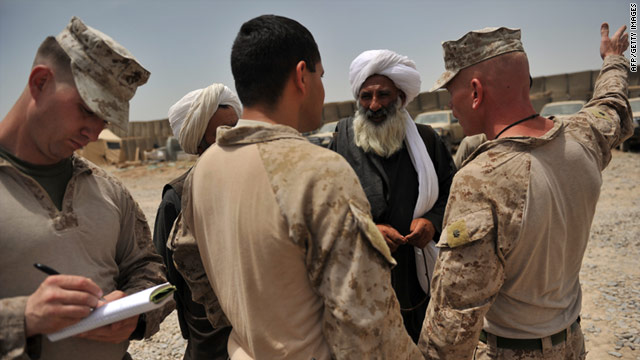May 4, 2011 11:05 p.m. EDT

Marine Lt. Col. John Harril talks to a leader in Helmand province, Afghanistan, as 1st Lt. Jake Freeman takes notes.
STORY HIGHLIGHTS
- Wesley Clark believes we should not withdraw military from Afghanistan too soon
- Assess intelligence found in bin Laden house and keep military capabilities in play, he says
- Clark: We must leave a strong political arrangement to avoid Taliban takeover, anarchy
- Clark: A more robust economic program that guards against corruption must be in place first
Editor's note: Wesley K. Clark, a retired Army general and NATO's former supreme allied commander in Europe, is a senior fellow at the Burkle Center for International Relations at the University of California at Los Angeles. Clark consults and advises companies in the satellite communications, biotechnology and energy fields, some with government and Department of Defense contracts. Clark was a Democratic candidate for president in the 2008 election.
(CNN) -- Behind the widespread jubilation upon the news of Osama bin Laden's death rests an important policy question: Can we now leave Afghanistan? After all, bin Laden is the reason we went there, 10 years ago. So, it's certainly a fair question.After 10 years, more than 1,400 American lives and hundreds of billions of dollars, there's plenty of reason to seek prompt withdrawal. And with the success against bin Laden, couldn't we just call it a victory and come home?
Here are three considerations arguing for toughing it out a little longer:
First, we captured a trove of intelligence in Osama's house. Exploitation of this information could enable us to complete a much more substantial destruction of the worldwide terrorist networks that make up al Qaeda. These remaining networks still pose a threat to the United States and to other nations.
These actions will take from days to months, and we need to keep our capabilities in play until we've inflicted the maximum damage on the enemy.
Second, we need to leave behind a substantial political arrangement when we withdraw. We don't want anarchy to ensue as U.S. forces leave, nor do we want our departure to invite a repeat of the Taliban takeover of the 1990s, nor instability in Pakistan.
This argues for using the momentum of the success against bin Laden to intensify the military pressures against the Taliban, both inside Afghanistan and at their sanctuaries in Pakistan.
Creating a sense of imminent defeat in their ranks is the quickest route to a successful political settlement on the ground.
This argues for no let-up into the summer months, and then, at the peak of our military efforts, establishing a diplomatic opening through Pakistan's connections and a direct one. And it argues for using our success to strengthen Pakistan's respect for America's capabilities and will to act.
Third, transforming our mission in the region from a highly expensive military mission to a less expensive foreign defense and development mission will take time -- and it will encourage the appreciation of the U.S. as a stable, long-term player in the region.
This argues for putting in place the framework for a much more robust economic program, with a strong anti-corruption component, before we take away the military effort.
So, look for no immediate pullout of any significance. But come July, should it be possible to announce future redeployments? You bet!
And can we look forward to a draw-down at a greater rate and with a far higher chance of long-term success? No doubt about it.
Ten years after 9/11, justice has been done, a wholesale revamping of U.S. offensive and defensive anti-terrorist capabilities has been achieved, and the American people are far safer.
It's been an arduous and expensive journey for us, with some major missteps along the way, but the take-down of Osama bin Laden proves to many doubters of American power and resolve around the world that the U.S. is "back." And we have the will and capabilities to finish the job in Afghanistan.
No comments:
Post a Comment